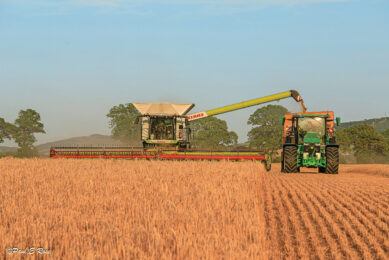New cross-border project on quest for multifunctional robots

In a new cross-border project called CIMAT, Belgian and Dutch universities, research institutes and robot and machine manufacturers aim at developing small scale multifunctional robots for sustainable and local food production.
Initiatives like ‘support your locals’ and ‘buy local’ that parallel the saying ‘think globally, act locally’ currently not only help consumers find and buy sustainable food in the area they live in and thus reducing their carbon footprint. It also enables producers, farmers, to sell their products as COVID-19 has paralysed common distribution to hotels, restaurants and other service providers.
Another effect of the pandemic is the shortage of skilled labour to harvest fresh produce all over the world. A situation that is bound to push digitisation of farms according to many people active in precision agriculture.
Downsizing machinery
The shortage of labour and the need to increase capacities to lower costs has led to big, heavy and expensive machinery with dedicated tasks, says Belgian research institute Inagro. Machinery that often is out of reach for SME farming and horticulture business as they can’t afford it. In particular, if they are organic producers or produce niche products.
Besides, says Inagro, agriculture is gradually evolving towards becoming more sustainable with minimum or at least as efficient as possible use of fertilisers and crop protection and limiting the emission of greenhouse gasses and soil degradation.
The new so-called Interreg project CIMAT, initiated by Belgian (Flemish) and Dutch universities, research institutes and robot and machine manufacturers aims at developing small scale multifunctional robots for sustainable and local food production. The project is funded by the European Regional Development Fund (ERDF) and is to enable SME’s manufacturers access to innovative mechatronic technologies such as the Internet of Things, sensors, algorithms, electrical power trains and software for autonomous vehicles. The aim of the CIMAT collaboration is to develop small, multifunctional robots for small-scale farms.
Text continues underneath images
Cross-border co-creation
“We aim to accelerate the development of high-tech agricultural machinery for small-scale agriculture”, says Stijn Debruyne of project partner KU Leuven. “It is important that the modular, autonomous robot can be used for various agricultural and horticultural tasks. This can be done by linking task-specific tools to a semi-autonomous unit. By having multiple units work together on a task, the system can also be deployed on a larger scale.”
Flemish and Dutch manufacturers and farmers are to cooperate in a co-creative process. Project partner Octinion (see for instance their strawberry picking robot in Future Farming Magazine 4-2018) designed a semi-autonomous platform that serves as an example and tool to achieve the project objective.
Looking for a grower to develop the robot
Currently, the project is looking for a non-organic Flemish/Dutch carrot grower who is interested in helping to develop the robot.
CIMAT is short for ‘Catalyst for Innovative Mechatronics in Agricultural Technology’ and currently unites Belgian project partners KU Leuven, ILVO, Inagro, pcPCfruit, Praktijkpunt Landbouw Vlaams-Brabant, Octinion and Vanhoucke Machine Eengineering. Dutch partners are Compas Agro, Delphy, Proefboerderij Rusthoeve and University College Roosevelt.
Join 17,000+ subscribers
Subscribe to our newsletter to stay updated about all the need-to-know content in the agricultural sector, two times a week.



